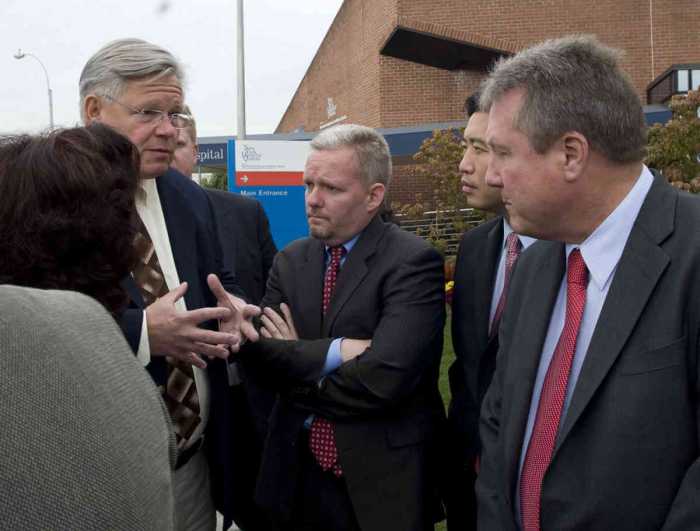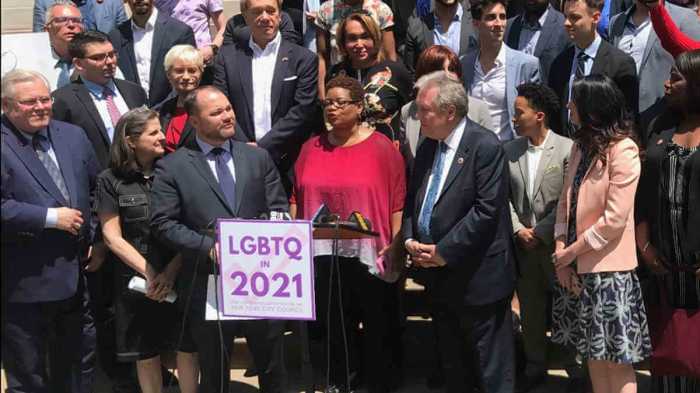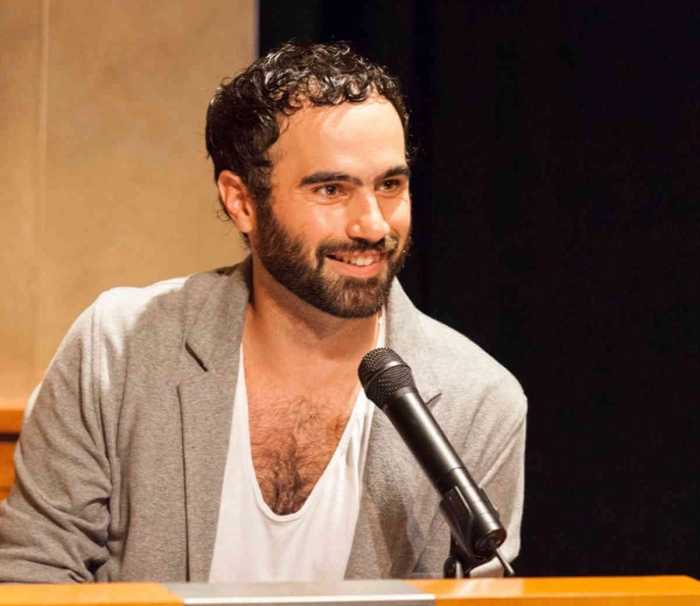In the face of shock, chagrin, and some withering criticism both on social media and from past executive directors, top staff and board members at the Empire State Pride Agenda pushed back against the notion they had declared “Mission Accomplished” in their December 12 announcement that they were winding down major operations over the next several months.
“We did not and are not declaring mission accomplished on LGBT equality,” said Norman C. Simon, chair of the Pride Agenda and co-chair of its affiliated educational Foundation. “What we are saying is that our top priorities have been completed, and that the remaining work that needs to be done we will transition to other organizations in the coming months in an orderly process.”
Saying that we was “troubled” to see the phrase “mission accomplished” in the immediate reporting and social media reaction to the group’s announcement, Simon, in a mid-afternoon call with Gay City News on December 13, said he would have brought that issue up had the question not been raised.
Fundraising in years since marriage equality win a grim reality for state LGBT lobby
State Senator Brad Hoylman, an out gay West Side Democrat, speaking to Gay City News roughly an hour before ESPA publicly released news of its planned closure, said, “You can’t declare a mission accomplished on LGBT rights. We have not gotten Senate consideration of an LGBT-related bill in almost five years.”
Among the top priorities in Hoylman’s mind was the Gender Expression Non-Discrimination Act –– a transgender civil rights measure that has languished in the Republican-led Senate for almost 13 years despite being passed repeatedly by the Assembly since 2007 –– a bill that would bar licensed mental health professionals from conducting so-called “conversion” therapy on LGBT youth, and a measure overturning the state’s ban on gestational surrogacy. Hoylman is the lead sponsor on the conversion and surrogacy bills, while his Downtown Democratic colleague Daniel Squadron is the lead on GENDA.
“It’s very, very important to have a group to engage the wider public,” Hoylman said. “The Senate minority is starved of resources to promote an LGBT agenda statewide.”
Jillian Weiss, a transgender advocate, attorney, and Ramopo College professor, also employed the term “mission accomplished” in criticizing ESPA’s failure to articulate a post-marriage equality vision.
“Those that cannot create a vision for the new challenges that remain for trans people, for LGBT people of color and LGBT youth, will rightly say, ‘mission accomplished,’” she wrote in an email.
Matt Foreman, who led the group for five years between 1998 and 2003 during which time ESPA was successful in winning enactment of state hate crimes and gay rights laws, was particularly harsh in his reaction to the group’s announcement.
“We are dealing with a political system and you need a political organization,” he told Gay City News by phone. “Albany doesn’t just respond to good ideas.”
Foreman focused his criticism both on the way the Pride Agenda reached its decision and on the message the announcement of that decision sent.
“There was zero consultation with folks who spent their lives building the Pride Agenda,” he said. “If they are going to make a decision of that magnitude, there has to be a consultative function. They need to talk to the stakeholders, to the communities around the state… This is an abrogation of a fundamental obligation that an organization has to its constituency… And, it plays into the national narrative that the job is done.”
The group’s handling of the question of GENDA in its press release was especially problematic in the view of the group’s critics.
“The Boards’ decision comes on the heels of securing the Pride Agenda’s top remaining policy priority –– protecting transgender New Yorkers from discrimination in housing, employment, credit, education, and public accommodations –– in the form of new regulations announced in partnership with Governor Andrew M. Cuomo,” ESPA’s release stated.
There was, however, no mention of GENDA, except in a Q&A sheet distributed to reporters. There, the group stated, “GENDA remains a priority for many LGBT New Yorkers and some partner LGBT organizations may continue to advocate for its passage. But given the Governor’s recent action, the Pride Agenda believes it has achieved its top policy goal of protecting transgender New Yorkers from discrimination.”
Asked how that statement did not amount to declaring victory before going home, Melissa Sklarz, a longtime transgender activist who is vice chair of the ESPA board and co-chair with Simon of the Foundation board, said the group would continue working to pass GENDA through its Political Action Committee, which the group plans to keep open.
Simon underscored the importance the group attached to making clear that the Cuomo regulations, separate from GENDA, carry “the full force of law.” But, in seconding Sklarz’s statement that the PAC would continue to push GENDA, he several times emphasized that it would play a vital role in Albany going forward in “protecting the gains” the community has made and being its policy voice.
Simon said it was too early, however, to know what staffing structure would be required to keep the PAC thriving and that the group was not ready to set a timeline for making that determination.
According to Foreman, ESPA’s PAC, though important, was never the prime mover of the organization’s agenda.
“What has moved Albany has been community pressure,” he said. “Making donations is not the same as having a detailed policy agenda.”
Data available through the New York State Board of elections suggests the modest role PAC dollars have played in an organization that in 2011 had a budget of more than $5 million. Contributions to the ESPA PAC reported on the state website amounted to roughly $185,000 and $148,000 in 2010 and 2011, respectively, at the height of the battle for marriage equality. Since then, that figure declined to about $100,000, $98,000, $52,000, and $41,000 for 2012 through 2015, respectively.
The decline in PAC contributions is part and parcel of a larger reduction in overall support for ESPA, particularly for the non-Foundation, 501(c)(4) entity, Empire State Pride Agenda, Inc. That is the part of the organization which is unlimited in its political activities, but for which donations are not tax-deductible.
In 2011, the year in which marriage equality was won, the Foundation had revenues of $2,333,673, while ESPA, Inc. had revenues of $2,731,607. Two years later, in 2013, the most recent year for which public figures are available, the Foundation had revenues of $2,129,832, while income to ESPA, Inc. had fallen to only $504,391.
The non-Foundation unit was also struggling with a negative net asset value of nearly $380,000, with outstanding liabilities of just over $600,000, the bulk of which was money owed to the Foundation.
Simon, both in the group’s written release and in comments to Gay City News, acknowledged the “challenges” facing any non-profit group after “mission victories” –– particularly a win on the order of magnitude of marriage equality for an LGBT organization. Still, he insisted that money was not the driving factor behind what he characterized as a “mission-driven” decision by the group’s two boards of directors.
Nathan Schaefer, who has served as ESPA’s executive director since 2012, did not hesitate to emphasize the victories that lay behind that “mission-driven” determination.
“The Pride Agenda has had a very decorated 25 years of success,” he said, before acknowledging, “The boards’ decision is, I know, difficult for many people to hear.”
The only elected official quoted in the Pride Agenda’s release this weekend was Cuomo, who said the group’s “impact will be felt for generations to come.”
For both Foreman and his ESPA successor, Alan Van Capelle, who led the group from 2003 until early 2010, the last word has not been written about a statewide LGBT advocacy group in New York.
Saying, “There needs to be a statewide organization that is able to hold elected officials feet to the fire,” Van Capelle told Gay City News, “As a community we need to have a statewide conversation about how we remain engaged and powerful. I don’t want it to take us a decade to reinvent the wheel when the next crisis comes up.”
Lamenting that New York –– in contrast to a state like California –– has made little headway on addressing “lived equality” through a host of legislative initiatives on issues from a conversion therapy ban to healthcare to family issues, Foreman, who said that “millions of dollars were spent on building up this brand, and now they are just throwing it away,” said he plans to speak soon to other former ESPA executive directors to see if they can help the community sort out next steps.
In the meanwhile, some transgender activists, such as Joann Prinzivalli, who has headed up the New York Transgender Rights Organization, are not holding their breath waiting for a signal from gay leadership from the past 25 years. Saying that a transgender-specific organization to push GENDA and other issues of concern is in the offing, she wrote, in an email message, “The trans community is in this for the long haul and we are going to have to ramp up our own efforts.”



































